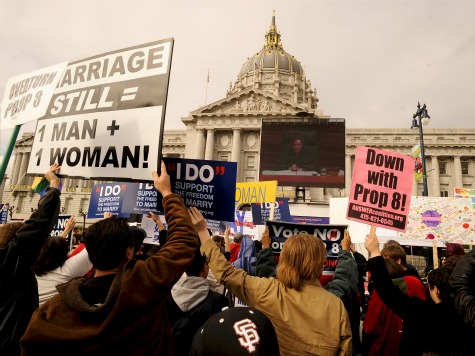If you are even slightly sympathetic to the cause of traditional marriage, you cannot help but be disturbed by its string of recent defeats. Not just in referendums and legislatures, where the contest is basically a fair one, but in the courts, which have canceled out the increasingly rare victories traditional marriage has won. You are left to conclude that the political game is rigged, and also–increasingly–that advocates for traditional marriage have barely put up a real fight.
Take, for example, the recent debate on Fox News Sunday between Ted Olson, the Republican who has successfully led the legal fight for marriage equality, and Tony Perkins, President of the Family Research Council.
It was a complete rout.
Invited by Fox News’ Chris Wallace to give his “single, strongest argument against allowing same-sex marriage,” Perkins declined, challenging Olson instead to define the purpose of marriage–which he did, calling it a “fundamental right.”
Perkins would have done far better to cite what one supposes are his religious convictions: that marriage is between one man and one woman because God said so–end of story.
Appeals to the Bible don’t convince skeptics, but instead of hiding from the essentially arbitrary definition of traditional marriage, Perkins ought to have embraced it. There is no definition of marriage that is not, at bottom, some human convention imposed on nature, a structure to guide our instincts.
Gay marriage is no different. While it is understandable that advocates of gay marriage recoil at comparisons to polygamous, incestuous, and animal marriages, the point of those analogies is not to warn that gay marriage leads down a slippery slope, but to illustrate that gay marriage, too, excludes certain possibilities on what is often an arbitrary basis. And what Olson describes as a “right” is not actually universal, then it is not a natural right but in fact a social convention.
Perkins also stumbled when he asserted that the purpose of traditional marriage “is not to affirm adults” but is “for the protection of children.” Tradition teaches otherwise.
The idealized marriage of the Old Testament is that of Abraham and Sarah, who are childless into old age. They hope for children, of course, but when children actually arrive, they prompt all kinds of complications.
Marriage is about both adults and children–and, more broadly, about fulfilling a higher purpose than love and desire.
You don’t have to believe in God or the Old Testament to understand heterosexual marriage as a social convention common across societies–not a reflection of nature, but a refinement of nature, the way conducting arithmetic in base ten happens to make the most of the fact that most of us are born with ten fingers.
Like many mathematical principles, traditional marriage is a postulate–one that does not need further justification in order to be useful, and universal.
Conventions change, sometimes radically–and often for the better. Yet advocates of same-sex marriage are at pains to avoid acknowledging that is what they are urging.
Instead, they duck arguments about convention, as Olson does, by using the language of right, which casts supporters of traditional marriage (wrongly) as bigots akin to opponents of interracial marriage.
The courts have largely gone along with that illogic, reading into the Fourteenth Amendment a right its authors surely never intended.
Unfortunately, those who support traditional marriage often play into their opponents’ hands–either by asserting some specific purpose of marriage that same-sex couples can also fulfill, or by appealing to nature rather than convention (“They can’t procreate,” Perkins said on Fox), which echoes (however unintentionally) old prejudices against homosexuality.
Ultimately, the best argument against same-sex marriage is that traditional marriage is “marriage,” period.
That may be arbitrary, but it is not “irrational,” in the sense that Olson and others have argued that states can have no “rational basis” for banning same-sex marriage. It is a convention enforced by law, like many others.
The real question is not why same-sex marriage must not be allowed, but why it is being imposed by judges, even after voters have begun to shift on their own (albeit after some bullying) towards acceptance of same-sex marriage.
Transforming social convention from above has negative consequences for the quality of our democracy–and also hurts gay and lesbian couples.
As the pro-gay marriage scholar James G. Dwyer has said: “Court victories are hollow victories for the LGBT community, failing to deliver the societal respect they seek, and in fact removing the opportunity for collective expression of such respect through voluntary legislative reform or popular referendum.”
Social conservatives would be doing both sides a favor by putting up a better fight.
Senior Editor-at-Large Joel B. Pollak edits Breitbart California and is the author of the new ebook, Wacko Birds: The Fall (and Rise) of the Tea Party, available for Amazon Kindle.
Follow Joel on Twitter: @joelpollak

COMMENTS
Please let us know if you're having issues with commenting.